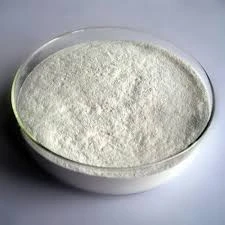
דצמ . 22, 2024 12:58 Back to list
hpmc solubility in water
Understanding HPMC Solubility in Water
Hydroxypropyl methylcellulose (HPMC) is a widely utilized semi-synthetic polymer that has garnered significant attention in various industries, particularly in pharmaceuticals, food, and construction. One of the critical properties of HPMC is its solubility in water, which plays an essential role in its functionality and applications.
HPMC is a cellulose ether derived from cellulose through a series of chemical modifications. The substitution of hydroxyl groups with hydroxypropyl and methoxy groups enhances its solubility in water. Unlike traditional cellulose, which is insoluble, HPMC is a versatile compound that can dissolve in water to form a viscous and stable solution. This property makes HPMC particularly valuable in applications where thickening, emulsification, or film-forming capabilities are required.
Understanding HPMC Solubility in Water
In pharmaceutical applications, HPMC is often used as a drug delivery agent. Its solubility in water allows for the development of various dosage forms, including tablets, capsules, and gels. When used in controlled-release formulations, HPMC can modulate the release of active pharmaceutical ingredients (APIs), enhancing the bioavailability of drugs. The ability of HPMC to form gel-like structures upon hydration can improve the stability of APIs, making it an ideal excipient in many formulations.
hpmc solubility in water

In the food industry, HPMC is utilized as a thickening and emulsifying agent in various products, ranging from sauces to dairy items. Its water solubility allows it to easily integrate into food matrices, improving texture and mouthfeel. Furthermore, HPMC serves as a fat replacer, providing a creamy consistency without the additional calories associated with fats. This capability has made HPMC a popular choice for healthier food alternatives.
The construction industry also benefits from HPMC's solubility in water. It is widely used in the formulation of mortars, plasters, and adhesives, where it acts as a water-retaining agent. The ability to dissolve in water and produce a smooth consistency helps improve workability and extends the open time of construction materials. This is particularly important in applications where adhesion and durability are paramount.
Despite its many advantages, the solubility of HPMC in water can present challenges, particularly in specific formulations. Careful consideration must be given to the choice of HPMC grades, as their solubility can vary greatly based on the extent of substitution and the molecular weight. Therefore, selecting the appropriate grade of HPMC is crucial for achieving the desired viscosity and performance in a given application.
In conclusion, the solubility of hydroxypropyl methylcellulose in water is a key factor that contributes to its widespread use across various industries. Its unique properties enable it to function effectively as a stabilizer, thickener, emulsifier, and drug delivery agent. As research and technology evolve, exploring new formulations and applications of HPMC will likely expand its utility even further, reinforcing its significance in both existing and emerging markets.
-
Versatile Hpmc Uses in Different Industries
NewsJun.19,2025
-
Redispersible Powder's Role in Enhancing Durability of Construction Products
NewsJun.19,2025
-
Hydroxyethyl Cellulose Applications Driving Green Industrial Processes
NewsJun.19,2025
-
Exploring Different Redispersible Polymer Powder
NewsJun.19,2025
-
Choosing the Right Mortar Bonding Agent
NewsJun.19,2025
-
Applications and Significance of China Hpmc in Modern Industries
NewsJun.19,2025







